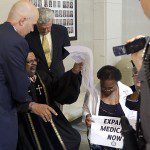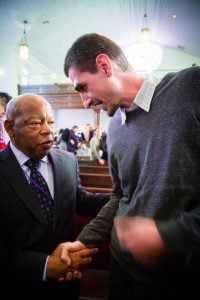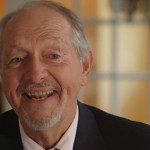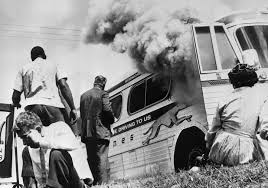 In the spring of 1961, Kennedy’s White House was focused on Cold War politics. The civil rights struggle in the South felt like a distraction to the President and his staff, the FBI opposed the movement as Communist, and most people in middle America were just getting ready for Mother’s Day weekend.
In the spring of 1961, Kennedy’s White House was focused on Cold War politics. The civil rights struggle in the South felt like a distraction to the President and his staff, the FBI opposed the movement as Communist, and most people in middle America were just getting ready for Mother’s Day weekend.
But the day after Mother’s Day, 1961, a burning bus was on the front cover a newspapers across the country.
In Aniston and Birmingham, AL, the Klan violently opposed integrated riders on public transit. The Justice Department intervened to cool things down. They flew the battered riders to New Orleans and tried to get them off national television.
But some students from Nashville insisted that the ride must go on. They took up the cause, and hundreds of them ended up doing time in Mississippi’s Parchman prison.
More importantly, “Freedom Rider” became a household name. And the Civil Rights Movement became a force in American politics.
Maybe the most astounding thing about the Freedom Ride of 1961 is this: college students changed the political conversation in America.
How did they do it? They had some experience, for sure. The sit-in movement had begun at NCA&T in 1960, sweeping the nation previous spring. By Easter, Ella Baker had organized an initial gathering of the Student Nonviolent Coordinating Committee. The Nashville students had been through a year of nonviolence training before that with Jim Lawson. Mentoring. Story-telling. Experience. All of it was important, but the end result is still astounding.
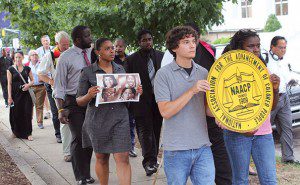 Half a century later, as we prepare to set out for this year’s 21st Century Freedom Ride, I’m impressed again by the young people who are getting on board. Here in North Carolina, the NAACP’s Youth and College Division has been deeply engaged in our Forward Together Movement, challenging attacks on voters rights.
Half a century later, as we prepare to set out for this year’s 21st Century Freedom Ride, I’m impressed again by the young people who are getting on board. Here in North Carolina, the NAACP’s Youth and College Division has been deeply engaged in our Forward Together Movement, challenging attacks on voters rights.
Can young people change a nation? Sometimes it’s hard to imagine how.
But you look back and see that they did.
Then you look around and see that they are.
And the only conclusion that makes any sense is what Ella Baker said when she was working with SNCC:
“Struggling myself don’t mean a whole lot. I’ve come to realize that teaching others to stand up and fight is the only way my struggle survives.”
Check out this great video of organizing that some of our 21st Century Freedom Riders did here in North Carolina this summer.


